Ethiopia is now Africa's fastest growing economy
- Get link
- X
- Other Apps
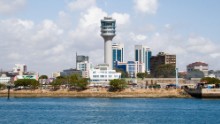
Photos: Africa's fastest growing economies
Tanzania – The East African nation is predicted to grow by 6.4% this year. The country has sustained strong economic growth in the last decade, averaging between 6 to 7% according to the World Bank.
Hide Caption
5 of 8

Photos: Africa's fastest growing economies
Ghana – Ghana was previously the fastest growing economy in Sub-Saharan Africa, but has slowed. Although, a sharp increase in oil production has helped support economic growth in the country.
Hide Caption
6 of 8

Photos: Africa's fastest growing economies
Benin – The West African country, Benin, is expected to have economic growth of around 6%.
Hide Caption
7 of 8

Photos: Africa's fastest growing economies
Burkina Faso – The landlocked West African country is also expected to experience economic growth of 6% this year.
Hide Caption
8 of 8

Photos: Africa's fastest growing economies
Ethiopia – A view of the capital of Ethiopia, Addis Ababa. The country has experienced fast economic growth in the last decade, averaging around 10% a year. Economists cite the country's manufacturing industry as a key element in the country's success.
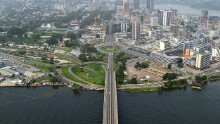
Photos: Africa's fastest growing economies
Ivory Coast – According to the IMF, Ivory Coast's economy is expected to grow by 7.4%. According to theWorld Bank, the country is world's top exporter of cocoa and raw cashew nuts.
Hide Caption
2 of 8
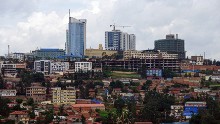
Photos: Africa's fastest growing economies
Rwanda – The small and landlocked country Rwanda is predicted to grow by 7.2%. The aim of their "Vision 2020" plan is to transform the country into a service and knowledge-based economy.
Hide Caption
3 of 8

Photos: Africa's fastest growing economies
Senegal – Senegal's economy is based on fishing, mining and agriculture. Its economy is expected to expand by 7% in 2018.
Hide Caption
4 of 8

Photos: Africa's fastest growing economies
Tanzania – The East African nation is predicted to grow by 6.4% this year. The country has sustained strong economic growth in the last decade, averaging between 6 to 7% according to the World Bank.
Hide Caption
5 of 8

Photos: Africa's fastest growing economies
Ghana – Ghana was previously the fastest growing economy in Sub-Saharan Africa, but has slowed. Although, a sharp increase in oil production has helped support economic growth in the country.
Hide Caption
6 of 8

Photos: Africa's fastest growing economies
Benin – The West African country, Benin, is expected to have economic growth of around 6%.
Hide Caption
7 of 8

Photos: Africa's fastest growing economies
Burkina Faso – The landlocked West African country is also expected to experience economic growth of 6% this year.
Hide Caption
8 of 8

Photos: Africa's fastest growing economies
Ethiopia – A view of the capital of Ethiopia, Addis Ababa. The country has experienced fast economic growth in the last decade, averaging around 10% a year. Economists cite the country's manufacturing industry as a key element in the country's success.
Hide Caption
1 of 8

Photos: Africa's fastest growing economies
Ivory Coast – According to the IMF, Ivory Coast's economy is expected to grow by 7.4%. According to theWorld Bank, the country is world's top exporter of cocoa and raw cashew nuts.
Hide Caption
2 of 8

Photos: Africa's fastest growing economies
Rwanda – The small and landlocked country Rwanda is predicted to grow by 7.2%. The aim of their "Vision 2020" plan is to transform the country into a service and knowledge-based economy.
Hide Caption
3 of 8

Photos: Africa's fastest growing economies
Senegal – Senegal's economy is based on fishing, mining and agriculture. Its economy is expected to expand by 7% in 2018.
Hide Caption
4 of 8
(CNN)Ethiopia, Africa's second most populated country, is forecast to be the fastest growing economy in Sub-Saharan Africa this year, according to new data from the IMF.
Ethiopia's economy is predicted to grow by 8.5% this year. The figures signal continued economic expansion following a long period of impressive growth. In the last decade, Ethiopia has averaged around 10% economic growth, according to the IMF.
To boost the economy, the country is pursuing a number of large-scale infrastructure projects, including the Grand Renaissance Dam and a railway network.
"(Ethiopia) has had a very high growth rate and I think that's a result in large part of a very concentrated effort by the government to boost industrial production and manufacturing," said Vijaya Ramachandran, an economist at the American think tank Center for Global Development (CGD).
Ramachandran, along with three academics, released a report suggesting Ethiopia can follow in China's footsteps, and become a destination for low-wage manufacturing jobs.
However, despite sustained economic growth, in the past few years Ethiopia has experienced increasing unrest from Oromo groups in the Oromiya region. According to human rights groups, the government has suppressed basic rights and freedoms.
New Prime Minister Abiye Ahmed was sworn at the beginning of April, signaling an intent to ease tensions.
Economic growth
Ivory Coast is expected to be the second fastest growing economy in the region at 7.4%. Rwanda's estimated economic growth is 7.2%, and the West African country Senegal is projected to have 7% growth.
The data reveals that Ghana, which was previously forecast as the fastest growing economy in Sub-Saharan Africa in October 2017, at 8.9%, slowed in its predicted growth to 6.4%. Last year, a reported surge in oil and gas production helped propel the country's economy.
Nigeria, Africa's largest economy, is predicted to grow by 2.1%, an increase from 1.9% forecast in October 2017.
"They've updated it to 2.1%. However, they have emphasized the risks. The falling commodity prices and imbalances that are to arise because of the elections," Bismarck Rewane, a Nigerian economist, told CNN.
South Africa's predicted growth stands at 1.5%.
Long term, according to a report from the World Bank in 2016, the proportion of the African population in extreme poverty has declined, but the overall number has increased as the continent's population expands.
Growth across the whole region is forecast to average 3.4%, below the total world growth figure of 3.9%.
- Get link
- X
- Other Apps
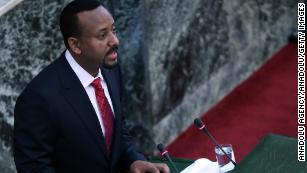
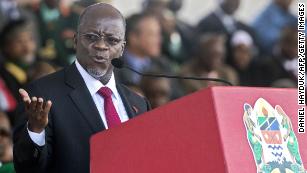
Comments
Post a Comment